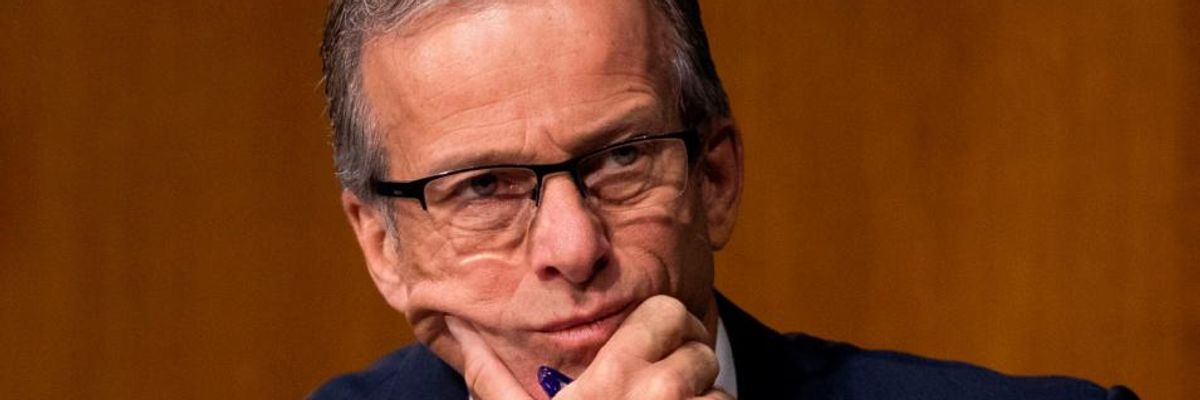
Sen. John Thune (R-S.D.) listens to remarks from Xavier Becerra during the Senate Finance Committee hearing on Becerra's nomination to be HHS secretary in Washington, D.C. on February 24, 2021. (Photo: Michael Reynolds/AFP via Getty Images)
John Thune's Childhood $6 Wage--$24 Adjusted for Inflation--Sure Helps Make the Case for At Least $15
"The worst thing is that these people aren't dumb. They know about inflation... They just don't think people who make their food and clean their bathrooms deserve the same things they got."
A story of the $6 wage he earned working in a restaurant as a kid blew up in the face of Sen. John Thune overnight after economic justice advocates pointed out that the powerful Republican's personal anecdote only goes to show that, adjusted for inflation, that seemingly low wage would now be somewhere north of $24 an hour--helping solidify the case that increasing the minimum wage to $15 by 2025 is the very least Congress should be doing.
"I started working by bussing tables at the Star Family Restaurant for $1/hour and slowly moved up to cook--the big leagues for a kid like me--to earn $6/hour," Thune, who represents South Dakota and is the second-most powerful Republican in the Senate, tweeted Wednesday night. "Businesses in small towns survive on narrow margins. Mandating a $15 minimum wage would put many of them out of business."
Several progressive critics quickly pointed out that, depending on the exact year when Thune, born in 1961, started earning $6 an hour, the seemingly modest wage he pulled in as a teenager would be equivalent to roughly $25 today.
\u201cassuming Thune was about 16 or 17 when started earning $6/hour, that would be equivalent to about $25/hour in today\u2019s dollars.\u201d— b-boy bouiebaisse (@b-boy bouiebaisse) 1614213752
A number of commentators noted that a senator's staff could easily verify the current worth of wages from the 1970s by using the CPI Inflation Calculator, raising questions about why they didn't.
Journalist Matt Novak suggested that Thune and other opponents of minimum wage hikes are well-aware of inflationary pressure on earnings and cost of living. "They just don't think people who make their food and clean their bathrooms deserve the same things they got," argued Novak.
\u201cThe worst thing is that these people aren't dumb. They know about inflation. Thune knows $6 in the 1970s is over $27 today adjusted for inflation. They fucking know this. They just don't think people who make their food and clean their bathrooms deserve the same things they got.\u201d— Matt Novak (@Matt Novak) 1614230336
While Republicans have based their opposition to raising wages on the notion that it would negatively affect small businesses, progressive Democrats such as Rep. Ro Khanna (D-Calif.) have argued that "we don't want low-wage businesses."
"I think most successful small businesses can pay a fair wage," said Khanna. "I don't want small businesses that are underpaying employees."
Thune wasn't the only GOP lawmaker who failed to acknowledge inflation when objecting to raising the wage floor to $15 per hour. Sen. Roger Marshall (R-Kan.) based his argument against increasing the minimum wage on the fact that his job in the late 1970s and early 1980s paid for his entire college tuition.
"When he graduated from Kansas State University," journalist Timothy Burke tweeted, "tuition was $898/year. It is now $10,000/year. The minimum wage was $3.35. It's now $7.25."
New York Times columnist Jamelle Bouie provided the inflation-adjusted figures: "His tuition was $3,600/year and the minimum wage was $13.44 an hour."
\u201cHe was born in 1960. Let\u2019s assume he went to college in 1978, tuition didn\u2019t increase during his time, and the value of the minimum wage remained steady. Adjusted for inflation, his tuition was $3,600/year and the minimum wage was $13.44 an hour.\u201d— b-boy bouiebaisse (@b-boy bouiebaisse) 1614213752
In another tweet denouncing Thune, Dr. Abdul El-Sayed, an epidemiologist and Medicare for All advocate, drew attention to the fact that Thune "didn't have to keep bussing tables and raise your kids on that wage."
"When you were young," El-Sayed continued, "your elected officials hadn't spent the last 30 years peddling tired 'hard work' arguments just to give handouts to corporations, bust unions, and automate and offshore jobs."
Former labor secretary Robert Reich noted that Thune's comments provided an important lesson about the necessity of ensuring that minimum wage increases are tied to changes in the cost of living.
"Let's raise the minimum wage to $15 an hour," Reich said, "and then peg it to inflation."
An Urgent Message From Our Co-Founder
Dear Common Dreams reader, The U.S. is on a fast track to authoritarianism like nothing I've ever seen. Meanwhile, corporate news outlets are utterly capitulating to Trump, twisting their coverage to avoid drawing his ire while lining up to stuff cash in his pockets. That's why I believe that Common Dreams is doing the best and most consequential reporting that we've ever done. Our small but mighty team is a progressive reporting powerhouse, covering the news every day that the corporate media never will. Our mission has always been simple: To inform. To inspire. And to ignite change for the common good. Now here's the key piece that I want all our readers to understand: None of this would be possible without your financial support. That's not just some fundraising cliche. It's the absolute and literal truth. We don't accept corporate advertising and never will. We don't have a paywall because we don't think people should be blocked from critical news based on their ability to pay. Everything we do is funded by the donations of readers like you. Will you donate now to help power the nonprofit, independent reporting of Common Dreams? Thank you for being a vital member of our community. Together, we can keep independent journalism alive when it’s needed most. - Craig Brown, Co-founder |
A story of the $6 wage he earned working in a restaurant as a kid blew up in the face of Sen. John Thune overnight after economic justice advocates pointed out that the powerful Republican's personal anecdote only goes to show that, adjusted for inflation, that seemingly low wage would now be somewhere north of $24 an hour--helping solidify the case that increasing the minimum wage to $15 by 2025 is the very least Congress should be doing.
"I started working by bussing tables at the Star Family Restaurant for $1/hour and slowly moved up to cook--the big leagues for a kid like me--to earn $6/hour," Thune, who represents South Dakota and is the second-most powerful Republican in the Senate, tweeted Wednesday night. "Businesses in small towns survive on narrow margins. Mandating a $15 minimum wage would put many of them out of business."
Several progressive critics quickly pointed out that, depending on the exact year when Thune, born in 1961, started earning $6 an hour, the seemingly modest wage he pulled in as a teenager would be equivalent to roughly $25 today.
\u201cassuming Thune was about 16 or 17 when started earning $6/hour, that would be equivalent to about $25/hour in today\u2019s dollars.\u201d— b-boy bouiebaisse (@b-boy bouiebaisse) 1614213752
A number of commentators noted that a senator's staff could easily verify the current worth of wages from the 1970s by using the CPI Inflation Calculator, raising questions about why they didn't.
Journalist Matt Novak suggested that Thune and other opponents of minimum wage hikes are well-aware of inflationary pressure on earnings and cost of living. "They just don't think people who make their food and clean their bathrooms deserve the same things they got," argued Novak.
\u201cThe worst thing is that these people aren't dumb. They know about inflation. Thune knows $6 in the 1970s is over $27 today adjusted for inflation. They fucking know this. They just don't think people who make their food and clean their bathrooms deserve the same things they got.\u201d— Matt Novak (@Matt Novak) 1614230336
While Republicans have based their opposition to raising wages on the notion that it would negatively affect small businesses, progressive Democrats such as Rep. Ro Khanna (D-Calif.) have argued that "we don't want low-wage businesses."
"I think most successful small businesses can pay a fair wage," said Khanna. "I don't want small businesses that are underpaying employees."
Thune wasn't the only GOP lawmaker who failed to acknowledge inflation when objecting to raising the wage floor to $15 per hour. Sen. Roger Marshall (R-Kan.) based his argument against increasing the minimum wage on the fact that his job in the late 1970s and early 1980s paid for his entire college tuition.
"When he graduated from Kansas State University," journalist Timothy Burke tweeted, "tuition was $898/year. It is now $10,000/year. The minimum wage was $3.35. It's now $7.25."
New York Times columnist Jamelle Bouie provided the inflation-adjusted figures: "His tuition was $3,600/year and the minimum wage was $13.44 an hour."
\u201cHe was born in 1960. Let\u2019s assume he went to college in 1978, tuition didn\u2019t increase during his time, and the value of the minimum wage remained steady. Adjusted for inflation, his tuition was $3,600/year and the minimum wage was $13.44 an hour.\u201d— b-boy bouiebaisse (@b-boy bouiebaisse) 1614213752
In another tweet denouncing Thune, Dr. Abdul El-Sayed, an epidemiologist and Medicare for All advocate, drew attention to the fact that Thune "didn't have to keep bussing tables and raise your kids on that wage."
"When you were young," El-Sayed continued, "your elected officials hadn't spent the last 30 years peddling tired 'hard work' arguments just to give handouts to corporations, bust unions, and automate and offshore jobs."
Former labor secretary Robert Reich noted that Thune's comments provided an important lesson about the necessity of ensuring that minimum wage increases are tied to changes in the cost of living.
"Let's raise the minimum wage to $15 an hour," Reich said, "and then peg it to inflation."
A story of the $6 wage he earned working in a restaurant as a kid blew up in the face of Sen. John Thune overnight after economic justice advocates pointed out that the powerful Republican's personal anecdote only goes to show that, adjusted for inflation, that seemingly low wage would now be somewhere north of $24 an hour--helping solidify the case that increasing the minimum wage to $15 by 2025 is the very least Congress should be doing.
"I started working by bussing tables at the Star Family Restaurant for $1/hour and slowly moved up to cook--the big leagues for a kid like me--to earn $6/hour," Thune, who represents South Dakota and is the second-most powerful Republican in the Senate, tweeted Wednesday night. "Businesses in small towns survive on narrow margins. Mandating a $15 minimum wage would put many of them out of business."
Several progressive critics quickly pointed out that, depending on the exact year when Thune, born in 1961, started earning $6 an hour, the seemingly modest wage he pulled in as a teenager would be equivalent to roughly $25 today.
\u201cassuming Thune was about 16 or 17 when started earning $6/hour, that would be equivalent to about $25/hour in today\u2019s dollars.\u201d— b-boy bouiebaisse (@b-boy bouiebaisse) 1614213752
A number of commentators noted that a senator's staff could easily verify the current worth of wages from the 1970s by using the CPI Inflation Calculator, raising questions about why they didn't.
Journalist Matt Novak suggested that Thune and other opponents of minimum wage hikes are well-aware of inflationary pressure on earnings and cost of living. "They just don't think people who make their food and clean their bathrooms deserve the same things they got," argued Novak.
\u201cThe worst thing is that these people aren't dumb. They know about inflation. Thune knows $6 in the 1970s is over $27 today adjusted for inflation. They fucking know this. They just don't think people who make their food and clean their bathrooms deserve the same things they got.\u201d— Matt Novak (@Matt Novak) 1614230336
While Republicans have based their opposition to raising wages on the notion that it would negatively affect small businesses, progressive Democrats such as Rep. Ro Khanna (D-Calif.) have argued that "we don't want low-wage businesses."
"I think most successful small businesses can pay a fair wage," said Khanna. "I don't want small businesses that are underpaying employees."
Thune wasn't the only GOP lawmaker who failed to acknowledge inflation when objecting to raising the wage floor to $15 per hour. Sen. Roger Marshall (R-Kan.) based his argument against increasing the minimum wage on the fact that his job in the late 1970s and early 1980s paid for his entire college tuition.
"When he graduated from Kansas State University," journalist Timothy Burke tweeted, "tuition was $898/year. It is now $10,000/year. The minimum wage was $3.35. It's now $7.25."
New York Times columnist Jamelle Bouie provided the inflation-adjusted figures: "His tuition was $3,600/year and the minimum wage was $13.44 an hour."
\u201cHe was born in 1960. Let\u2019s assume he went to college in 1978, tuition didn\u2019t increase during his time, and the value of the minimum wage remained steady. Adjusted for inflation, his tuition was $3,600/year and the minimum wage was $13.44 an hour.\u201d— b-boy bouiebaisse (@b-boy bouiebaisse) 1614213752
In another tweet denouncing Thune, Dr. Abdul El-Sayed, an epidemiologist and Medicare for All advocate, drew attention to the fact that Thune "didn't have to keep bussing tables and raise your kids on that wage."
"When you were young," El-Sayed continued, "your elected officials hadn't spent the last 30 years peddling tired 'hard work' arguments just to give handouts to corporations, bust unions, and automate and offshore jobs."
Former labor secretary Robert Reich noted that Thune's comments provided an important lesson about the necessity of ensuring that minimum wage increases are tied to changes in the cost of living.
"Let's raise the minimum wage to $15 an hour," Reich said, "and then peg it to inflation."

